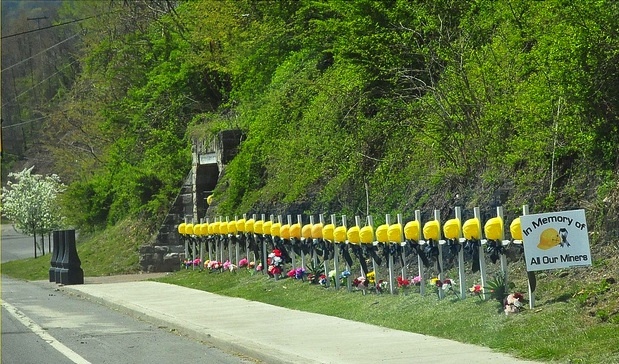Big Coal's war on its workers

A memorial for the 29 miners killed in the 2010 Upper Big Branch mine disaster in West Virginia. (Photo by jamiev_03 via Flickr.)
By Phil Mattera, Dirt Diggers Digest
Fossil-fuel apologists have accused the Obama administration of waging a war on coal in its effort to cut power plant greenhouse gas emissions. Yet the main source of the industry's distress is the energy market, and the real war is the one coal companies have for years carried out against the health and safety of its workforce.
There's no doubt that Big Coal is in trouble. One of the industry's largest players, Alpha Natural Resources, recently filed for Chapter 11 bankruptcy protection, following the path taken by competitors such as James River Coal, Walter Energy and Patriot Coal. Financial weakness prompted the delisting of Alpha and Walter Energy from the New York Stock Exchange. Industry leader Peabody Energy has seen its share price tumble even before the current market tumult. It is now trading at around $2 a share, compared to $70 in 2011.
Given the outsize role played by coal in the climate crisis, it is difficult to work up much sympathy for the industry in its time of trouble. While it is tempting to simply let the dirty industry shrink towards disappearance, there needs to be a just transition for those who have risked their lives extracting the fossilized carbon from the ground.
The magnitude of that risk has been made clear to me recently in the preparatory work I've been doing for the Violation Tracker database my colleagues and I at Good Jobs First will release this fall. The initial version will cover penalties imposed by agencies such as the Environmental Protection Agency, the Occupational Safety and Health Administration and, most relevant to the current discussion, the Mine Safety and Health Administration.
Based on preliminary results, it now appears that coal mining companies will turn out to be among the corporations with the largest aggregate federal environmental, health and safety penalties during the past five years. The largest mining offender is Alpha Natural Resources, whose penalty tally will top $100 million.
That reflects the fact that Alpha is now home to two of the most controversial firms in U.S. mining history: Pittston Coal and Massey Energy. Pittston had a long record of environmental and safety violations before its operations were used in the creation of Alpha in 2002, but even more notorious was Massey, which was responsible, among other things, for the 2010 Upper Big Branch mining disaster in West Virginia that took the lives of 29 workers, the most fatalities in a U.S. coal accident in 40 years. In the wake of that disaster, which an independent report attributed to management failures, Alpha agreed to purchase Massey. We thus attribute Massey's violations to it.
At least 20 other coal mining companies will show up in Violation Tracker with $1 million or more in total penalties. The largest amounts, in excess of $30 million each, will be linked to Murray Energy, whose head Robert Murray has vowed his firm will be the "last man standing" in the coal industry, and Patriot Coal.
Patriot, a spinoff from Peabody Energy, is a prime example of the vindictiveness of the coal industry toward miners. Its Chapter 11 filing earlier this year was its second in three years. In both cases the company has tried to use the bankruptcy court as a way to undermine its contractual commitments to United Mine Workers members and retirees, especially with regard to pension and health plan contributions. Its current move against worker benefits comes as the company, which is trying to sell off its assets, is awarding more than $6 million in executive bonuses.
A repeated health and safety violator and a raider of worker benefits. It's hard to imagine anyone will be sad to see Patriot disappear.
